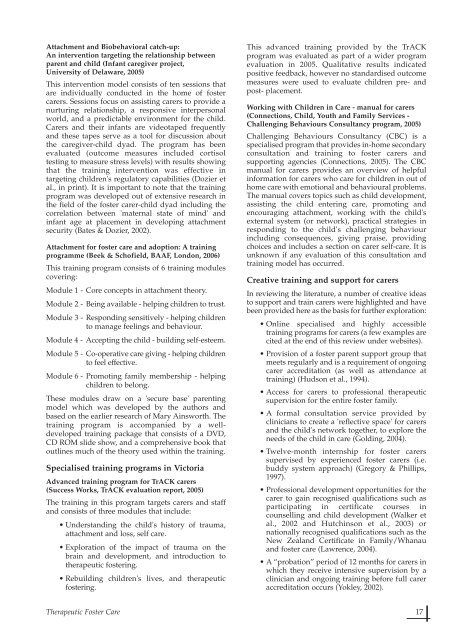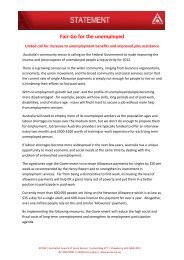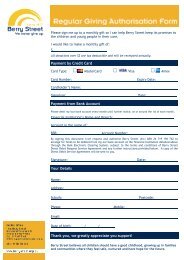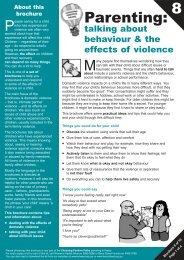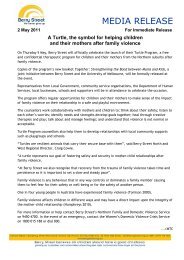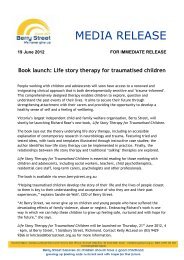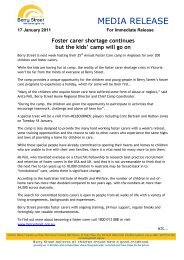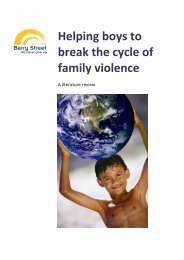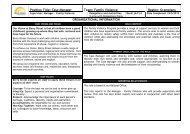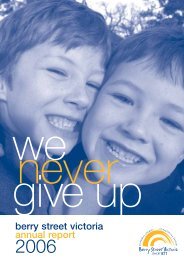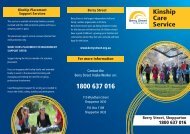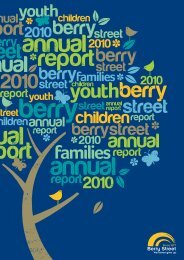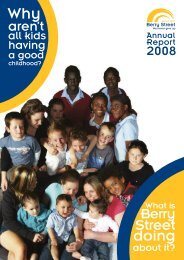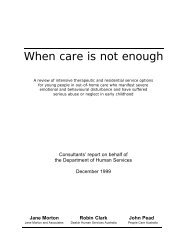Therapeutic foster care - Berry Street Childhood Institute
Therapeutic foster care - Berry Street Childhood Institute
Therapeutic foster care - Berry Street Childhood Institute
You also want an ePaper? Increase the reach of your titles
YUMPU automatically turns print PDFs into web optimized ePapers that Google loves.
Attachment and Biobehavioral catch-up:<br />
An intervention targeting the relationship between<br />
parent and child (Infant <strong>care</strong>giver project,<br />
University of Delaware, 2005)<br />
This intervention model consists of ten sessions that<br />
are individually conducted in the home of <strong>foster</strong><br />
<strong>care</strong>rs. Sessions focus on assisting <strong>care</strong>rs to provide a<br />
nurturing relationship, a responsive interpersonal<br />
world, and a predictable environment for the child.<br />
Carers and their infants are videotaped frequently<br />
and these tapes serve as a tool for discussion about<br />
the <strong>care</strong>giver-child dyad. The program has been<br />
evaluated (outcome measures included cortisol<br />
testing to measure stress levels) with results showing<br />
that the training intervention was effective in<br />
targeting children's regulatory capabilities (Dozier et<br />
al., in print). It is important to note that the training<br />
program was developed out of extensive research in<br />
the field of the <strong>foster</strong> <strong>care</strong>r-child dyad including the<br />
correlation between 'maternal state of mind' and<br />
infant age at placement in developing attachment<br />
security (Bates & Dozier, 2002).<br />
Attachment for <strong>foster</strong> <strong>care</strong> and adoption: A training<br />
programme (Beek & Schofield, BAAF, London, 2006)<br />
This training program consists of 6 training modules<br />
covering:<br />
Module 1 - Core concepts in attachment theory.<br />
Module 2 - Being available - helping children to trust.<br />
Module 3 - Responding sensitively - helping children<br />
to manage feelings and behaviour.<br />
Module 4 - Accepting the child - building self-esteem.<br />
Module 5 - Co-operative <strong>care</strong> giving - helping children<br />
to feel effective.<br />
Module 6 - Promoting family membership - helping<br />
children to belong.<br />
These modules draw on a 'secure base' parenting<br />
model which was developed by the authors and<br />
based on the earlier research of Mary Ainsworth. The<br />
training program is accompanied by a welldeveloped<br />
training package that consists of a DVD,<br />
CD ROM slide show, and a comprehensive book that<br />
outlines much of the theory used within the training.<br />
Specialised training programs in Victoria<br />
Advanced training program for TrACK <strong>care</strong>rs<br />
(Success Works, TrACK evaluation report, 2005)<br />
The training in this program targets <strong>care</strong>rs and staff<br />
and consists of three modules that include:<br />
• Understanding the child's history of trauma,<br />
attachment and loss, self <strong>care</strong>.<br />
• Exploration of the impact of trauma on the<br />
brain and development, and introduction to<br />
therapeutic <strong>foster</strong>ing.<br />
• Rebuilding children's lives, and therapeutic<br />
<strong>foster</strong>ing.<br />
This advanced training provided by the TrACK<br />
program was evaluated as part of a wider program<br />
evaluation in 2005. Qualitative results indicated<br />
positive feedback, however no standardised outcome<br />
measures were used to evaluate children pre- and<br />
post- placement.<br />
Working with Children in Care - manual for <strong>care</strong>rs<br />
(Connections, Child, Youth and Family Services -<br />
Challenging Behaviours Consultancy program, 2005)<br />
Challenging Behaviours Consultancy (CBC) is a<br />
specialised program that provides in-home secondary<br />
consultation and training to <strong>foster</strong> <strong>care</strong>rs and<br />
supporting agencies (Connections, 2005). The CBC<br />
manual for <strong>care</strong>rs provides an overview of helpful<br />
information for <strong>care</strong>rs who <strong>care</strong> for children in out of<br />
home <strong>care</strong> with emotional and behavioural problems.<br />
The manual covers topics such as child development,<br />
assisting the child entering <strong>care</strong>, promoting and<br />
encouraging attachment, working with the child's<br />
external system (or network), practical strategies in<br />
responding to the child's challenging behaviour<br />
including consequences, giving praise, providing<br />
choices and includes a section on <strong>care</strong>r self-<strong>care</strong>. It is<br />
unknown if any evaluation of this consultation and<br />
training model has occurred.<br />
Creative training and support for <strong>care</strong>rs<br />
In reviewing the literature, a number of creative ideas<br />
to support and train <strong>care</strong>rs were highlighted and have<br />
been provided here as the basis for further exploration:<br />
• Online specialised and highly accessible<br />
training programs for <strong>care</strong>rs (a few examples are<br />
cited at the end of this review under websites).<br />
• Provision of a <strong>foster</strong> parent support group that<br />
meets regularly and is a requirement of ongoing<br />
<strong>care</strong>r accreditation (as well as attendance at<br />
training) (Hudson et al., 1994).<br />
• Access for <strong>care</strong>rs to professional therapeutic<br />
supervision for the entire <strong>foster</strong> family.<br />
• A formal consultation service provided by<br />
clinicians to create a 'reflective space' for <strong>care</strong>rs<br />
and the child's network together, to explore the<br />
needs of the child in <strong>care</strong> (Golding, 2004).<br />
• Twelve-month internship for <strong>foster</strong> <strong>care</strong>rs<br />
supervised by experienced <strong>foster</strong> <strong>care</strong>rs (i.e.<br />
buddy system approach) (Gregory & Phillips,<br />
1997).<br />
• Professional development opportunities for the<br />
<strong>care</strong>r to gain recognised qualifications such as<br />
participating in certificate courses in<br />
counselling and child development (Walker et<br />
al., 2002 and Hutchinson et al., 2003) or<br />
nationally recognised qualifications such as the<br />
New Zealand Certificate in Family/Whanau<br />
and <strong>foster</strong> <strong>care</strong> (Lawrence, 2004).<br />
• A “probation” period of 12 months for <strong>care</strong>rs in<br />
which they receive intensive supervision by a<br />
clinician and ongoing training before full <strong>care</strong>r<br />
accreditation occurs (Yokley, 2002).<br />
<strong>Therapeutic</strong> Foster Care 17


